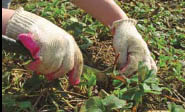Some farmers go to work on a tractor and some drive a truck, but in San Francisco and a growing roster of other American cities, farmers hop the bus to work or show up on their bicycles with their hoes in tow. This is urban agriculture in the 21st century.
MyFarm was started by Trevor Paque, a young mortgage broker, who decided in 2007 to get out of the office and take up farming. Hardly a new idea, but Paque took a new approach. His business plan called for building, planting, and harvesting vegetable gardens in small overgrown, weed-infested patches of soil that many people in San Francisco call back yards. Pricing for each garden includes $50 for a site analysis to check sunlight and soil; $600 to $1,000 to build raised beds, install drip irrigation, and plant seeds; and $20 to $35 for weekly maintenance and harvesting. As part of the weekly maintenance, the farmer harvests a box of vegetables for the owner. To test the market, Paque posted an ad on Craigslist and within 20 minutes he had 200 responses.
Today his backyard farming business has a waiting list and continues to expand without any further advertising. Paque discovered many city dwellers didn’t have the time, energy, strength, or know-how to grow their own vegetables. And those who already had a garden neglected to pull the weeds or even pick the fresh produce. One key to Paque’s success seems to be full-service farming.
His customers are enjoy a rich array of vegetables every season of the year. The list of produce ranges from the usual broccoli, carrots, peas, and summer squash to Chinese cabbage, Japanese mustard greens, Jerusalem artichokes, arugula, escarole, baby spinach, and tomatillos, along with heirloom varieties such as lazy housewife beans and bull’s blood beets.
As Paque sees it, the benefits of urban farming are endless. Food scraps from the table can be composted for the garden rather than hauled off in diesel burning trucks, neighbors can sell shares of their bounty to those who have no backyards, harvest dinners can create community by bringing people together to enjoy their seasonal favorites, and fresh, nutrient-dense, organic foods can be eaten by more people at reasonable prices.
For more information visit myfarmsf.com
In “Greener Pastures,” PERC’s director of media relations LINDA PLATTS presents green ventures from the audacious to the sublime.



